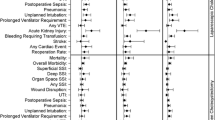Abstract
We sought to determine the accuracy of the Model for End-Stage Liver Disease and the Mayo Clinic Postoperative Mortality Risk in Patients with Cirrhosis Calculator in patients with ascites who underwent colorectal surgery. The National Surgical Quality Improvement Program database was queried for patients with ascites who underwent a major colorectal operation. Predicted 90-day mortality rate based on the Model for End-Stage Liver Disease and 30-day mortality based on the Mayo Clinic Postoperative Mortality Risk in Patients with Cirrhosis Calculator were compared with observed 30-day mortality. The cohort contained 3137 patients with ascites who underwent a colorectal operation. The Model for End-Stage Liver Disease predicted that 252 (8 %) of patients with ascites undergoing colorectal operations would die within 90 days postoperatively, yet we observed 821 deaths (26 % mortality) within 30 days after surgery (p < 0.001). The Mayo Clinic Postoperative Mortality Risk in Patients with Cirrhosis Calculator predicted that 491 (16.6 % mortality) of patients with ascites undergoing colorectal operations would die within 30 days postoperatively, yet we observed 707 (23.9 % mortality) at 30 days (p < 0.01). We concluded that the current risk prediction models significantly under predict mortality in patients with ascites who underwent colorectal surgery.


Similar content being viewed by others
References
Runyon BA. Care of patients with ascites. N Engl J Med. 1994;330(5):337–42.
Malinchoc M, Kamath PS, Gordon FD, Peine CJ, Rank J, Ter borg PC. A model to predict poor survival in patients undergoing transjugular intrahepatic portosystemic shunts. Hepatology. 2000;31(4):864–71.
Teh SH, Nagorney DM, Stevens SR, et al. Risk factors for mortality after surgery in patients with cirrhosis. Gastroenterology. 2007;132(4):1261–9.
Ghaferi AA, Mathur AK, Sonnenday CJ, Dimick JB. Adverse outcomes in patients with chronic liver disease undergoing colorectal surgery. Ann Surg. 2010;252(2):345–50.
Neeff HP, Streule GC, Drognitz O, et al. Early mortality and long-term survival after abdominal surgery in patients with liver cirrhosis. Surgery. 2014;155(4):623–32.
Hedrick TL, Swenson BR, Friel CM. Model for End-stage Liver Disease (MELD) in predicting postoperative mortality of patients undergoing colorectal surgery. Am Surg. 2013;79(4):347–52.
American College of Surgeons National Surgical Quality Improvement Program. http://www.acsnsqip.org – Chicago, IL, 2011. Accessed April 21, 2015.
Health Information Privacy. http://www.hhs.gov/ocr/privacy- Washington, DC, 2011. Accessed July 27, 2011.
Khuri SF, Daley J, Henderson W, et al. The Department of Veterans Affairs’ NSQIP: the first national, validated, outcome-based, risk-adjusted, and peer-controlled program for the measurement and enhancement of the quality of surgical care. National VA Surgical Quality Improvement Program. Ann Surg. 1998; 228:491–507.
Rowell KS, Turrentine FE, Hutter MM, Khuri SF, Henderson WG. Use of National Surgical Quality Improvement Program data as a catalyst for quality improvement. J Am Coll Surg. 2007; 204: 1293–1300.
American College of Surgeons National Surgical Quality Improvement Program: User Guide for the 2011 Participant Use Data File. http://site.acsnsqip.org/wp-content/uploads/2013/10/ACSNSQIP.PUF_.UserGuide.2012 – Chicago, IL, 2011. Accessed April 21, 2015.
Wiesner R, Edwards E, Freeman R, et al. Model for end-stage liver disease (MELD) and allocation of donor livers. Gastroenterology. 2003;124(1):91–6.
Al Sibae MR, Cappell MS. Accuracy of MELD scores in predicting mortality in decompensated cirrhosis from variceal bleeding, hepatorenal syndrome, alcoholic hepatitis, or acute liver failure as well as mortality after non-transplant surgery or TIPS. Dig Dis Sci. 2011;56(4):977–87.
Heidelbaugh JJ, Bruderly M. Cirrhosis and chronic liver failure: part I. Diagnosis and evaluation. Am Fam Physician. 2006;74(5):756–62.
Huang LL, Xia HH, Zhu SL. Ascitic Fluid Analysis in the Differential Diagnosis of Ascites: Focus on Cirrhotic Ascites. J Clin Transl Hepatol. 2014;2(1):58–64.
Runyon BA. Management of adult patients with ascites due to cirrhosis. Hepatology. 2004;39(3):841–56.
Acknowledgments
No funding support
Author information
Authors and Affiliations
Corresponding author
Ethics declarations
Disclosures
The American College of Surgeons National Surgical Quality Improvement Program and the hospitals participating in the American College of Surgeons National Surgical Quality Improvement Program are the source of the data used herein; they have not verified and are not responsible for the statistical validity of the data analysis or the conclusions derived by the authors.
Rights and permissions
About this article
Cite this article
Pantel, H.J., Stensland, K.D., Nelson, J. et al. Should We Use the Model for End-Stage Liver Disease (MELD) to Predict Mortality After Colorectal Surgery?. J Gastrointest Surg 20, 1511–1516 (2016). https://doi.org/10.1007/s11605-016-3167-2
Received:
Accepted:
Published:
Issue Date:
DOI: https://doi.org/10.1007/s11605-016-3167-2




